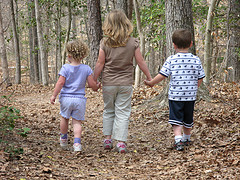 Sure, your kids know how to work the DVR, how to research school projects on the Internet, and how to download the latest apps on their phone, but will they know how to handle difficult life situations? Here are some skills that every child should know.
Sure, your kids know how to work the DVR, how to research school projects on the Internet, and how to download the latest apps on their phone, but will they know how to handle difficult life situations? Here are some skills that every child should know.
Getting Lost
Getting separated from your family is a terrifying proposition for children. Whether it’s in the forest or a crowded mall, being lost can be scary. It’s essential that you teach your kids the best way to respond to getting lost in any type of situation. Teach your child that as soon as he recognizes that he is lost, he should stop walking. Reiterate that you will be looking for him and the more he moves around, the harder it will be to find him. If he’s in the wilderness, he should call out. If he’s in a public place, such as a store, he could ask a salesperson with nametag to assist him.
Secret Word
You should create a secret word with your child. Explain that you will always use the secret word in the event that you send someone they may not know to pick them up. For instance, if something happens to you and you must send a co-worker to pick your child up from school, the co-worker will use the secret word, so your child knows it’s safe to go with him. Statistics show that child abductions occur more often within the family than it does with strangers, so it’s a good idea to use the secret word even if family members are picking up your child. Make sure that the word is easy to remember and practice weekly reminders so that neither of you forget.
911
Even young children can be taught to dial 911 in an emergency. If your child is shy or not used to speaking on the phone, you can practice what he might need to say to the emergency operator. Explain that the operator will want to know exactly what the emergency is and may even ask that he follow specific instructions. Tell your child that they must stay on the phone with 911 until help arrives. Teach him your address and keep it written clearly in an easily accessible location. Even if he has it memorized, the stress of the emergency may cause him to draw a blank. Having essential information at eye level will help him feel more in control, and therefore, less afraid.
Teach your children to be prepared for any emergency situation, and be prepared yourself. For financial preparedness, visit Jason Hartman’s web site for detailed advice on your fiscal future. (Top image: Flickr | vastateparksstaff)
The Holistic Survival Team
